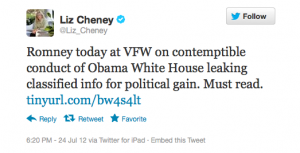Cheney’s Thugs Win the Prize for Leak Hypocrisy
 I wasn’t much interested in Mitt Romney’s latest efforts to change the narrative from the evil things he profited off of at Bain Capital and the tax havens he stashed the money he got as a result. Not only don’t I think journalists will be all that interested in Mitt’s claim that Obama’s White House is a leaky sieve. But I’m not about to defend the Most Fucking Transparent™ White House in Fucking History against such accusations.
I wasn’t much interested in Mitt Romney’s latest efforts to change the narrative from the evil things he profited off of at Bain Capital and the tax havens he stashed the money he got as a result. Not only don’t I think journalists will be all that interested in Mitt’s claim that Obama’s White House is a leaky sieve. But I’m not about to defend the Most Fucking Transparent™ White House in Fucking History against such accusations.
Until Cheney’s thugs start leading the attack.
Such as Eric Edelman, who says we need “change” because Obama’s Administration leaked details of the Osama bin Laden raid.
Eric Edelman is this guy:
Shortly after publication of the article in The New Republic, LIBBY spoke by telephone with his then Principal Deputy [Edelman] and discussed the article. That official asked LIBBY whether information about Wilson’s trip could be shared with the press to rebut the allegations that the Vice President had sent Wilson. LIBBY responded that there would be complications at the CIA in disclosing that information publicly, and that he could not discuss the matter on a non-secure telephone line
Four days after Edelman made the suggestion to leak information about Joe Wilson’s trip, Scooter Libby first revealed to Judy Miller that Valerie Plame worked at the CIA.
But Edelman is not the only one of Cheney’s thugs bewailing leakers: (h/t Laura Rozen, who follows BabyDick so I don’t have to)
Romney today at VFW on contemptible conduct of Obama White House leaking classified info for political gain. Must read. http://tinyurl.com/bw4s4lt
Now, to be fair to dear BabyDick, unlike Edelman she has not been directly implicated in her father’s deliberate exposure of a US CIA officer working to stop nuclear proliferation. Unlike Edelman, she was not protected from legal jeopardy by Scooter Libby’s lies.
But she did co-author her father’s book, which was a whitewash of his treachery (even if it did reveal that Cheney had a second interview with Pat Fitzgerald, one treated as a grand jury appearance, just around the time Fitzgerald subpoenaed Judy Miller. BabyDick Cheney is complicit in the lies the Cheney thugs have used to hide what a contemptible leak for political gain the Plame leak was.
And now she thinks she should lecture others about far less treacherous leaks?
